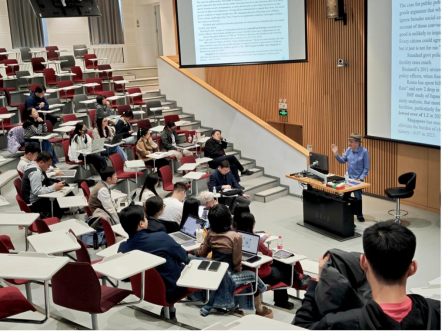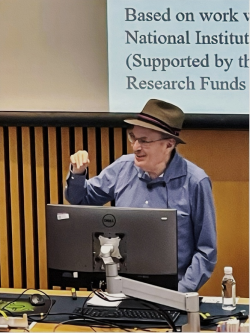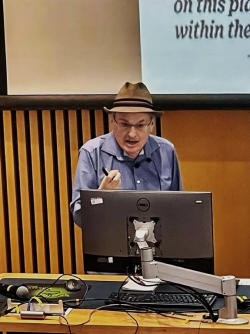On March 20, Zhishan College had the honor of hosting Professor Richard Freeman, a distinguished labor economist from Harvard University, for a thought-provoking lecture titled “Grandparents to the Rescue? The Impact of Grandparent Childcare on Fertility in China.” Held in the East Lecture Hall, the event was part of the college’s ongoing Labor Economics Dialogue Series, moderated by Professor Tang Ke and Professor Xie Danxia. Over 80 students and faculty members from across the university attended the event, sparking active academic exchange and discussion.

The lecture delved into cutting-edge developments in labor economics, with a particular focus on how labor markets, demographic shifts, and technological progress are reshaping employment landscapes in China and around the world.
Professor Freeman opened the talk by highlighting a global trend of declining fertility rates. Drawing on demographic data, he predicted that the world population would likely peak at around 10 billion by the 2080s, after which it would begin to shrink. He pointed out that countries such as China, Japan, South Korea, and several European nations are expected to experience especially sharp population declines.
Zooming in on China, Professor Freeman noted that the country’s fertility rate has dropped significantly since 2018, falling from an average of 1.5 children per woman to just 1 child per woman in 2023, with some provinces reporting even lower rates. At the same time, China’s aging population is expanding rapidly and is projected to reach approximately 475 million people by 2050. This demographic shift will dramatically alter the ratio of working-age individuals to dependents, placing growing pressure on the country’s labor force.


As he examined the various factors that influence fertility decisions in Chinese families, Professor Freeman underscored the crucial role that grandparents play in childcare. Drawing on data from the China Family Panel Studies (CFPS), he presented compelling empirical evidence showing a positive correlation between grandparental support and families' decisions to have a second child.
In light of these findings, Professor Freeman proposed a potential policy framework he called the "Grandparents to the Rescue" model. The core idea is to actively involve grandparents in childcare as a means of easing the burden on working parents and, in turn, encouraging higher fertility rates. He argued that population policy in China should reframe grandparents not just as dependents, but as valuable contributors to family support systems. Creating an environment where families feel supported in their childbearing decisions could be key to addressing the country’s declining fertility rate.
During the Q&A session, Professor Freeman engaged enthusiastically with audience members, offering insightful, thorough responses to a wide range of questions. His depth of knowledge and thoughtful communication inspired curiosity and reflection among attendees, sparking further interest in the study of labor economics and population policy.
Writer: Temelidi Yulia
Reviewers: Wang Dan

